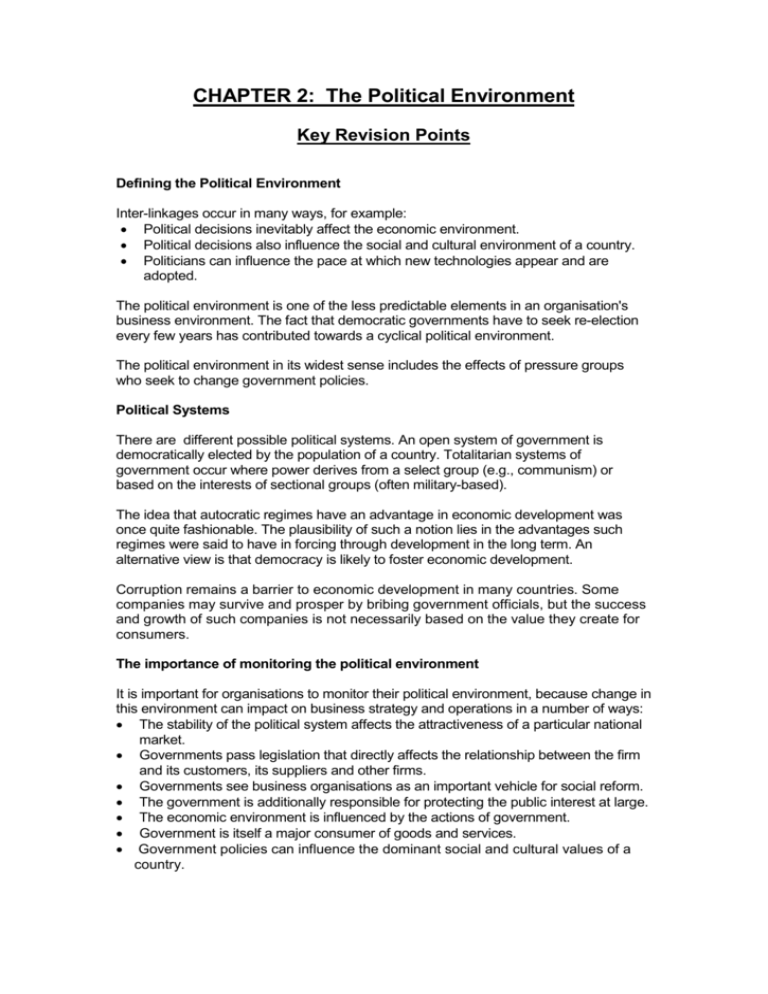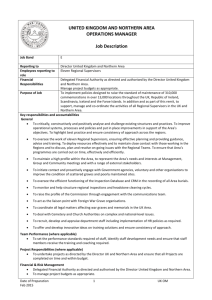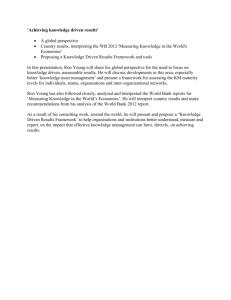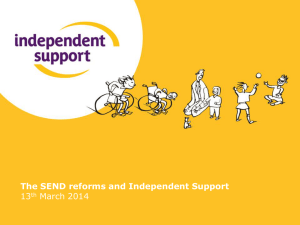CHAPTER 8: The Political Environment
advertisement

CHAPTER 2: The Political Environment Key Revision Points Defining the Political Environment Inter-linkages occur in many ways, for example: Political decisions inevitably affect the economic environment. Political decisions also influence the social and cultural environment of a country. Politicians can influence the pace at which new technologies appear and are adopted. The political environment is one of the less predictable elements in an organisation's business environment. The fact that democratic governments have to seek re-election every few years has contributed towards a cyclical political environment. The political environment in its widest sense includes the effects of pressure groups who seek to change government policies. Political Systems There are different possible political systems. An open system of government is democratically elected by the population of a country. Totalitarian systems of government occur where power derives from a select group (e.g., communism) or based on the interests of sectional groups (often military-based). The idea that autocratic regimes have an advantage in economic development was once quite fashionable. The plausibility of such a notion lies in the advantages such regimes were said to have in forcing through development in the long term. An alternative view is that democracy is likely to foster economic development. Corruption remains a barrier to economic development in many countries. Some companies may survive and prosper by bribing government officials, but the success and growth of such companies is not necessarily based on the value they create for consumers. The importance of monitoring the political environment It is important for organisations to monitor their political environment, because change in this environment can impact on business strategy and operations in a number of ways: The stability of the political system affects the attractiveness of a particular national market. Governments pass legislation that directly affects the relationship between the firm and its customers, its suppliers and other firms. Governments see business organisations as an important vehicle for social reform. The government is additionally responsible for protecting the public interest at large. The economic environment is influenced by the actions of government. Government is itself a major consumer of goods and services. Government policies can influence the dominant social and cultural values of a country. Organisations have to not only monitor the political environment – they also contribute to it. Political Ideologies Political ideologies in the UK have changed through a series of cycles during the post 2nd world war period. For business organisations, understanding shifts in dominant ideologies can be crucial to understanding the future nature of their business environment. Two important and recurring ideological issues which affect business organisations are the distribution of wealth between different groups in society and the role of the state versus the private sector in delivering goods and services. Political Parties Most members of parliament belong to a political party. Political parties represent an ideological point of view, although it has been noted that in recent years the ideological gap between the main UK parties has been reducing. Because political parties represent a diverse range of ideological issues, it is not surprising that party leaders often find it difficult to gain the unanimous support of all members on all issues. Social Exclusion Social exclusion is a shorthand term for what can happen when people or areas suffer from a combination of linked problems such as unemployment, poor skills, low incomes, poor housing, high crime environments, bad health and family breakdown. In response to these problems, the UK government created the Social Exclusion Unit in December 1997. Its remit has been to help improve Government action to reduce social exclusion by producing ‘joined-up solutions to joined-up problems.’ Redistribution of Wealth Governments with socialist leanings have recognised that there is nothing inherently just in the pattern of market rewards that reflects the accidents of heredity and the labour skills that happen to be in demand at the time. A distinguishing feature of the left in politics is often its belief in a positive role for government. Minimum wage legislation, introduced in the UK in 1999 may provide guaranteed levels of income for the poorest members of society, but higher earning individuals invariably seek to maintain differentials, leaving minimum wage employees in a position of relative poverty. The Structure of Government Government influence on businesses in the United Kingdom can be divided into the following categories: Central government Regional government Local government European Union (EU) government Supranational government Most countries have hierarchical levels of government which follow a roughly similar pattern. Central Government The government system of most western countries can be divided into four separate functions. The legislature, the executive, the civil service and the judiciary. Parliament Parliament provides the supreme legislative authority in the United Kingdom and comprises the Monarch, the House of Commons and the House of Lords. The lobbying of Members of Parliament has become an increasingly important activity, brought about by individuals and pressure groups to try and protect their interests where new legislation is proposed. The executive In practice, the executive plays a very important role in formulating policies which parliament then debates and invariably accepts. In the United Kingdom, the principal elements of the executive comprise the Cabinet and Ministers of State. The Cabinet The main executive element of central government is made up of the Prime Minister and Cabinet, who determine policy and who are responsible for the consequences of their policies. In practice, the Prime Minister is particularly dependent upon the support of a small inner cabinet of senior colleagues. Ministers of State The government of the country is divided between a number of different departments of state. Each department is headed by a Minister or Secretary of State who is a political appointee. The civil service The civil service is the secretariat responsible for implementing government policy. The fact that civil servants are relatively expert in their areas and generally remain in their posts for much longer than their minister gives them great power. The nature of the career civil servant is changing with the emergence of NonDepartmental Public bodies (NDPBs) to take over many of the activities of civil service departments. Organisations seeking to influence government policy must recognise the power that civil servants have in advising their Minister. The judiciary The judiciary is independent of government and judges in the United Kingdom are answerable to the Crown and not to politicians. Through the court system, citizens can have some redress against a legislature, executive or civil service that acts beyond its authority. Business organisations have become increasingly willing to use the courts to challenge allegedly incorrect government procedures which have put them at a disadvantage. Regional and National Government Although many European countries have historically had some degree of regional government, this has been largely absent in the UK. The end of the 1990s changed the structure of government in the UK with the emergence of regional elected government. However, this is only a partial system of regional government covering some parts of the United Kingdom, and the constitution of powers of each is very different. In the United Kingdom, assemblies are differentiated by region: Scotland Wales Northern Ireland London Other regional assemblies Local Government Local authorities in the United Kingdom are responsible for a wide range of services, from social services and education to refuse collection and street cleaning. From the mid 1990s, the basic structure of local government set up by the 1974 Act has been changed further by the appointment of commissions to study the needs of local government in individual areas. This has led to the emergence of ‘unitary’ authorities that combine functions of District and County Councils. The relationship between central and local government It has been argued that local government in Britain is losing its independence from central government, despite claims by successive governments that they support a philosophy of less government and a decentralisation of powers. In addition, legislation setting performance standards in education and social services (among others) has limited the independence of local government to set locally determined standards. The European Union The European Union (EU), formerly known as the European Community (EC) was founded by the Treaty of Rome, signed in 1857. On 1st January 1994 the European Community linked with five of the seven members of the European Free Trade Association (EFTA) to create the ‘ European Economic Area ‘ (‘EEA’). Aims of the EU The Treaty of Rome initially created a Customs Union and a Common Market. There is considerable debate about the form that future development of the EU should take and, in particular, the extent to which there should be political as well as economic union. The creation of a common unit of currency has been seen by many as crucial to the development of a single European market, avoiding the cost and uncertainty for business and travellers of having to change currencies for cross-border transactions. Argument continues about the amount of influence the EU should have in nation states' social and economic policy. Many additional countries have now formally or informally applied to join the EU. The structure of the EU The Treaty of Rome (as modified by the Treaty of Maastricht) developed a structure of government whose elements reflect the structure of the UK government. The executive (or Cabinet) is provided by the Council of Ministers; the secretariat (or Civil Service) is provided by the European Commission; while the legislature is provided by the European Parliament. The judiciary is represented by the European Court of Justice. New legislation is increasingly the result of co-operation between the various institutions of the EU. The Council of Ministers The Council of Ministers represents the governments of member states and can be regarded as the principal lawmaker of the EU, although it can only act on proposals submitted by the Commission. Each member state sends one Minister to the European Council of Ministers. The Council of Ministers adopts new legislation either by simple majority, qualified majority or unanimity: The Council of Ministers can generally pass laws even if the European Parliament disagrees with them, unlike the practice within the UK system. The European Commission Each member state sends one Commissioner to the Commission (the larger members send two), each appointed by the member government for a renewable term of four years. They are supported in their work by a staff of about 14 000 civil servants, divided between 23 directorates-general and mainly based at the Commission's headquarters in Brussels. The Commission has an initiation, mediation and implementation role. The European Parliament The European Parliament is primarily consultative and has relatively little power. Its main function is to monitor the activities of other EU institutions. It can give an opinion on Commission proposals but only has powers to amend, adopt or reject legislation, especially the EU budget. It also has the theoretical power to dismiss the entire Commission. The European Court of Justice The supreme legislative body of the EU is the Court of Justice. It is the final arbiter in all matters of interpreting Community Treaties and rules on disputes between member states. Towards an EU constitution? At the Nice summit in 2000, the leaders of member states proposed a constitution for the EU because its expansion to 27 members in 2007 threatened to slow down the decision-making process to the speed of the slowest country. The treaty to establish a constitution for Europe was agreed by EU heads of government in June 2004, but rejected in May 2005 by referenda of voters in France and the Netherlands. A revised constitution was proposed following the Lisbon summit in 2007. There has also been pressure for the appointment of a President of the EU for a term longer than the current rotating six-month presidency. A permanent President would potentially have much greater influence inside and outside the EU. Relationship between EU and UK government Primary legislation is contained in the Treaties of Rome (and subsequent treaties agreed by an Inter-Governmental Conference) and takes precedence over national legislation. Secondary legislation is made by the Council of Ministers and the Commission under authority delegated to them by the Treaties. Secondary legislation affects member states in several forms. Effects of EU membership on UK business organisations The EU is having an increasingly important effect on business organisations in the United Kingdom. The relationship between a company and its customers is increasingly being influenced by EU regulations and directives, for example in the provision of safety features in cars and the labelling of foods. To an increasing extent, lobbying of the UK parliamentary process is becoming less effective as the United Kingdom is bound to implement legislation emanating from the EU. Supranational governmental organisations National governments' freedom of action is further constrained by international agreements and membership of international organisations. Probably the most important organisation which affects UK government policy is the United Nations (UN). In matters of national security, the United Kingdom is a member of the North Atlantic Treaty Organisation (NATO) whose role is changing following the end of the ‘Cold War’. Improving the standards of Government Administration Standards of public-sector services can be improved by offering rewards to those public bodies that are performing well, while taking funds away from those that are failing. A number of recent UK government initiatives for improvement are shown below: Government performance targets Government organisations have been set increasingly detailed performance targets. Managers are often paid a bonus based on their achievement of targets. An alternative approach is to encourage public-sector organisations to achieve more general status labels based on their performance. The Charter Mark and the Beacon Council are good examples of award schemes introduced by the UK government. Joined-up government Central, regional and local government can at times seem an amorphous mass of departments, each not appearing to know what the others are doing. There have been many documented cases where different government departments have taken completely opposing policy directions, thereby cancelling each other out. Creating ‘joined-up’ thinking is never easy, even within profit-oriented private sector organisations. Impacts of government on business operations The impacts of the political environment on business organisations can be explained in three levels of effect: The transformation of many government departments into ‘NonDepartmental Public Bodies’ (NDPBs) The 1990s saw significant developments in the delegation of powers from government organisations to ‘arms length’ executive agencies, often referred to collectively as quasi-autonomous non-governmental organisations (QUANGOs), or more correctly, Non-Departmental Public Bodies (NDPBs). NDPBs enjoy considerable autonomy from their parent department and the sponsoring Minister has no direct control over the activities of the body, other than making the appointment of the chairman. The outsourcing of many government functions and collaboration with the private sector through public-private partnerships (PPPs) Public Private Partnership (PPP) is a term used to cover a wide range of activities in which the public and private sectors work together to improve services. One form of PPP is a project under the Private Finance Initiative (PFI), but PPP could also extend to other forms of partnership, for example, joint ventures. PPPs transfer risk to the private sector. This means that should a project under the PPP overrun its budget, the Government and taxpayers would not be left to pick up the bill. However the price inevitably includes a high premium to cover the risk of a budget overrun. The effects of governments legislation on business operations While large organisations may be able to afford specialists to handle administrative matters and can spread the cost over large volumes of output, government regulation can hit small businesses very hard. Even the Internet, which was supposed to simplify many administrative tasks, has led to new government-imposed burdens on businesses. Worried at the prospect of organised crime using the Internet, the government passed the controversial Regulation of Investigatory Powers (RIP) Act. This was bitterly contested by business for its provisions enabling the interception of emails and electronic correspondence. The incoming New Labour government of 1997 set out – as with many previous governments – on a mission to reduce unnecessary regulation, by creating the Better Regulation Task Force. Influences on Government Policy Formation A distinction can be drawn between political parties and pressure groups or interest groups. These latter groups seek to change policy in accordance with members' interests, generally advancing a relatively narrow cause. Unlike members of political parties, members of pressure groups generally work from outside the political system and do not become part of the political establishment. Pressure groups Pressure groups can be divided into a number of categories. They can also be classified according to their functions. Sectional groups exist to promote the common interests of their members over a wide range of issues. Pressure groups can influence government policy using three main approaches: - Propaganda - Represent the views of the group directly to policy formers on a one-to-one basis - To carry out research and to supply information Role of the media The media - press, radio and television and increasingly the Internet - not only spreads awareness of political issues but also influences policy and decision-making by setting the political agenda and influencing public opinion.






